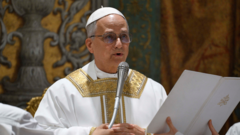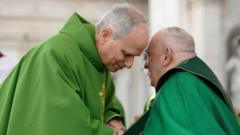With the impending election of the next pope following the passing of Pope Francis, the College of Cardinals is set for a significant conclave, marking a historic potential shift in leadership.
Who are the frontrunners to become the next Pope?

Who are the frontrunners to become the next Pope?
Unpredictable dynamics shape the future of the papacy as candidates emerge.
In a groundbreaking moment for the Catholic Church, the College of Cardinals is readying for a conclave in the Sistine Chapel to elect the successor to Pope Francis, whose passing has left a vacancy that holds immense global significance for the 1.4 billion Roman Catholics worldwide. This election is shaping up to be notably unpredictable as a mix of factors converge, such as a more diverse electorate within the College of Cardinals and the potential for a pope from outside Europe.
Appointed predominantly by Pope Francis himself, around 80% of the cardinals participating in the conclave have the chance to broaden the Church’s perspective, with fewer than half being European for the first time. The process involves debate and voting until one candidate secures a majority, creating an environment where predictions are daunting.
Many are wondering whether the next leader could hail from Africa or Asia or whether the Vatican will opt for a more traditional figure. Among the potential successors are several notable names, each with distinct attributes and a variety of opinions shaping their candidacy.
**Cardinal Pietro Parolin** from Italy, the Vatican's former secretary of state, is often viewed as a frontrunner, leveraging his diplomatic experience and insight into global issues. At 70, he is respected for prioritizing dialogue but has faced criticism for his traditionalist views regarding marriage.
**Cardinal Luis Antonio Gokim Tagle** of the Philippines, known as the "Asian Francis," is 67 and has gained support for his focus on social issues and his moderate stance, appealing to many within the church. His pastoral background contrasts with the more bureaucratic roles often found in the Vatican.
**Cardinal Fridolin Ambongo Besungu**, aged 65 and hailing from the Democratic Republic of Congo, exemplifies the Church's growth in Africa. A conservative figure, he brings strong advocacy for his congregation but also openness toward interfaith collaboration.
Among other candidates, **Cardinal Peter Kodwo Appiah Turkson** from Ghana, aged 76, would make history as the first African pope in 1,500 years, emphasizing the Church's presence in Africa. **Cardinal Reinhard Marx** of Germany (71) is also a prominent figure, advising on Church reform while wrestling with internal challenges.
There are others like **Cardinal Robert Prevost**, a 69-year-old American shaping contemporary Church governance, and notable voices like **Cardinal Robert Sarah**, aged 79, who remain rooted in conservative traditions.
The conclave promises to be a pivotal moment for the Catholic Church as an array of candidates reflects the need for a new papal direction, which could reverberate well beyond the confines of the Vatican. The next pope's election remains uncertain, showcasing a blend of historic traditions and modern dynamics at play.
Appointed predominantly by Pope Francis himself, around 80% of the cardinals participating in the conclave have the chance to broaden the Church’s perspective, with fewer than half being European for the first time. The process involves debate and voting until one candidate secures a majority, creating an environment where predictions are daunting.
Many are wondering whether the next leader could hail from Africa or Asia or whether the Vatican will opt for a more traditional figure. Among the potential successors are several notable names, each with distinct attributes and a variety of opinions shaping their candidacy.
**Cardinal Pietro Parolin** from Italy, the Vatican's former secretary of state, is often viewed as a frontrunner, leveraging his diplomatic experience and insight into global issues. At 70, he is respected for prioritizing dialogue but has faced criticism for his traditionalist views regarding marriage.
**Cardinal Luis Antonio Gokim Tagle** of the Philippines, known as the "Asian Francis," is 67 and has gained support for his focus on social issues and his moderate stance, appealing to many within the church. His pastoral background contrasts with the more bureaucratic roles often found in the Vatican.
**Cardinal Fridolin Ambongo Besungu**, aged 65 and hailing from the Democratic Republic of Congo, exemplifies the Church's growth in Africa. A conservative figure, he brings strong advocacy for his congregation but also openness toward interfaith collaboration.
Among other candidates, **Cardinal Peter Kodwo Appiah Turkson** from Ghana, aged 76, would make history as the first African pope in 1,500 years, emphasizing the Church's presence in Africa. **Cardinal Reinhard Marx** of Germany (71) is also a prominent figure, advising on Church reform while wrestling with internal challenges.
There are others like **Cardinal Robert Prevost**, a 69-year-old American shaping contemporary Church governance, and notable voices like **Cardinal Robert Sarah**, aged 79, who remain rooted in conservative traditions.
The conclave promises to be a pivotal moment for the Catholic Church as an array of candidates reflects the need for a new papal direction, which could reverberate well beyond the confines of the Vatican. The next pope's election remains uncertain, showcasing a blend of historic traditions and modern dynamics at play.





















